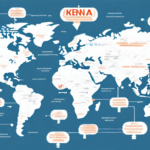Understanding UPS Shipping Rates for 50 Pounds from the US to Kenya
Shipping goods internationally requires selecting a reliable and efficient courier service to ensure your items arrive safely and on time. UPS is one of the most popular choices for international shipments. This article delves into the UPS shipping rates for a 50-pound package from the US to Kenya, exploring the factors that influence these rates and offering insights to optimize your shipping strategy.
What is UPS and How Does It Work?
UPS (United Parcel Service) is a global courier company offering package delivery and supply chain management services. With over 500,000 employees, UPS operates in more than 220 countries and territories worldwide. The company utilizes a fleet of aircraft and trucks, alongside advanced technology, to manage its logistics and tracking systems efficiently.
Founded in 1907 in Seattle, Washington, by James E. Casey and Claude Ryan, UPS began as the American Messenger Company, with deliveries made on foot and by bicycle. Today, it has grown into a multi-billion-dollar corporation, delivering over 20 million packages and documents daily.
Beyond package delivery, UPS provides comprehensive supply chain management solutions, including inventory management, transportation, and warehousing services. Partnering with UPS allows businesses to streamline operations and enhance overall efficiency.
Factors Affecting UPS Shipping Rates
Several factors influence the shipping rates for international shipments. Key determinants of UPS shipping rates from the US to Kenya include:
- Weight and Dimensions: Heavier and larger packages incur higher shipping costs.
- Destination: The specific country and city destination can impact rates due to varying logistics costs.
- Service Type: The chosen UPS shipping service, such as Express or Standard, affects pricing.
- Package Value and Contents: Higher-value items may require additional insurance, increasing costs.
- Customs and Duties: Import taxes and duties imposed by Kenya influence the total shipping cost.
- Delivery Timeframe: Faster delivery options typically come at a premium price.
Additionally, the mode of transportation plays a role; air freight is faster but more expensive compared to sea freight, which is cost-effective for bulkier shipments. Balancing these factors is crucial to obtaining the best value for your shipping needs.
Calculating Shipping Rates for a 50-Pound Package from the US to Kenya
The most straightforward method to calculate shipping rates for a 50-pound package is by using the UPS shipping calculator available on the UPS website. Input the package's weight, dimensions, destination city, and desired shipping service to receive an accurate estimate.
As of 2023, the standard UPS shipping rate for a 50-pound package from the US to Kenya starts at approximately $450 using the UPS Worldwide Express service. Rates may vary based on the factors previously mentioned.
Be aware of additional fees such as customs duties, taxes, and brokerage fees, which can significantly impact the total cost. Understanding these charges in advance helps prevent unexpected expenses.
Types of UPS Shipping Services Available
UPS offers a variety of international shipping services tailored to different needs:
- UPS Worldwide Express: Fastest option with delivery in 1-3 business days.
- UPS Worldwide Saver: Delivers within 2-5 business days, balancing speed and cost.
- UPS Worldwide Expedited: Cost-effective for less urgent shipments, delivered in 4-7 business days.
- UPS Standard: Most affordable option, suitable for non-time-sensitive packages.
Each service offers unique features, such as guaranteed delivery times with UPS Worldwide Express or more economical rates with UPS Standard. Selecting the appropriate service depends on your specific requirements for speed, cost, and reliability.
Pros and Cons of Using UPS for International Shipping
Choosing UPS for international shipping comes with several advantages:
- Extensive Global Reach: Operates in over 220 countries and territories.
- Advanced Tracking: Real-time tracking and comprehensive supply chain management.
- Reliable Delivery: Consistent and dependable delivery schedules.
However, there are also some drawbacks:
- Higher Costs: Premium services can be expensive compared to other couriers.
- Customs Complexity: Navigating international customs can be challenging.
- Potential Delays: External factors like weather or political instability may cause delays.
Despite the higher costs, UPS's expertise in handling international shipments and their commitment to sustainability initiatives make them a strong contender for businesses prioritizing reliability and environmental responsibility.
Customs and Duties When Shipping to Kenya
Shipping to Kenya involves understanding the country's import regulations. The Kenyan government imposes taxes and duties on imported goods, which vary based on the product type, value, and origin. UPS offers customs brokerage services to assist with the necessary paperwork and clearance processes.
Prohibited items include firearms, counterfeit products, and certain chemicals. It is crucial to verify that your shipment complies with Kenyan regulations to avoid penalties or confiscation.
Clear and accurate labeling of your package, including detailed descriptions and valuations, facilitates smoother customs clearance. Ensure all required documentation, such as invoices and permits, accompany your shipment to prevent delays.
Delivery Times for UPS International Shipments
UPS delivery times for international shipments depend on the selected service and destination:
- Worldwide Express: 1-3 business days.
- Worldwide Saver: 2-5 business days.
- Worldwide Expedited: 4-7 business days.
- UPS Standard: 5-8 business days.
External factors such as weather, political unrest, or natural disasters can impact delivery schedules. Additionally, certain items may face restrictions or require additional processing, further affecting delivery times. Always verify current conditions and regulations before shipping.
Saving Money on International Shipping with UPS
To reduce international shipping costs with UPS, consider the following strategies:
- Choose Slower Services: Opting for services like UPS Worldwide Expedited or UPS Standard can significantly lower costs.
- Use Flat Rate Boxes: UPS offers flat rate boxes that allow shipping for a fixed price, regardless of weight or destination, ideal for bulky items.
- Consolidate Shipments: Combining multiple packages into a single shipment can reduce overall shipping fees.
- Compare Couriers: Evaluate rates from different carriers to ensure you are getting the best deal for your specific needs.
Implementing these methods can lead to substantial savings, especially for businesses with regular shipping needs.
Tips for Properly Packaging Your Shipment
Proper packaging is vital to ensure your shipment arrives safely:
- Select a Sturdy Box: Use a box that is strong enough to withstand handling and appropriately sized for your items.
- Protect Fragile Items: Utilize cushioning materials like bubble wrap or foam to secure delicate products.
- Seal Securely: Use high-quality packing tape to firmly close the box, preventing accidental openings.
- Label Clearly: Clearly write the recipient's and sender's addresses, and include a packing slip or invoice inside the package.
Investing time in proper packaging minimizes the risk of damage and ensures a smoother shipping process.
How to Track Your UPS Shipment
UPS offers robust tracking and monitoring tools for all shipments:
- Online Tracking: Use the UPS tracking tool on their website or mobile app for real-time updates.
- Notifications: Subscribe to email or text alerts to receive status updates on your package.
- UPS My Choice: Gain access to enhanced tracking features and more detailed information about your shipment's progress.
For international shipments, UPS provides tracking through customs, keeping you informed about the package's journey and any potential delays.
Common International Shipping Problems and Solutions
International shipping can present challenges such as customs delays, damaged shipments, and lost packages. To mitigate these issues:
- Customs Delays: Ensure all documentation is accurate and complete to facilitate smooth customs clearance.
- Package Damage: Use high-quality packaging materials and clearly mark the package as fragile if necessary.
- Lost Packages: Utilize UPS's tracking services and consider additional insurance for high-value items.
- Unexpected Fees: Research and understand all potential fees and taxes beforehand to avoid surprises.
Working with a reliable courier like UPS and following best practices in packaging and documentation can significantly reduce the likelihood of encountering these problems.
Conclusion: Is UPS the Right Choice for Your International Shipment?
UPS stands out as a dependable and efficient courier service for international shipments, offering a wide range of services, advanced tracking, and a global network. Its expertise in handling customs and commitment to sustainability make it a strong choice for both businesses and individuals. However, it's essential to consider the costs and potential drawbacks, such as higher shipping fees and the complexity of international regulations, before deciding. By evaluating your specific shipping needs and utilizing UPS's resources effectively, you can determine if UPS is the optimal solution for your international shipping requirements.



















